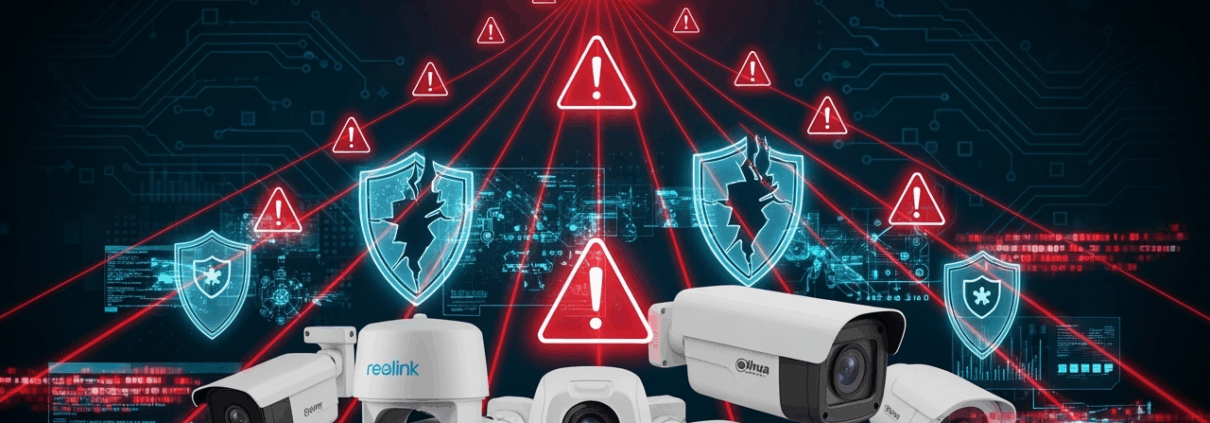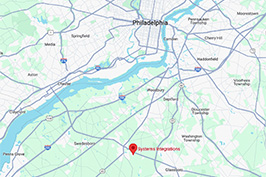Critical Security Alert: Reolink and Dahua Camera Vulnerabilities Demand Immediate Action
The cybersecurity landscape has been shaken by the discovery of critical vulnerabilities affecting millions of security cameras worldwide. CISA has issued urgent warnings about four new vulnerabilities being actively exploited, while researchers have uncovered serious flaws in Dahua cameras that could allow complete remote takeover. For businesses relying on these surveillance systems, immediate action is required.
CISA’s Latest Warning: Four Vulnerabilities Under Active Attack
The Cybersecurity and Infrastructure Security Agency (CISA) has added four new vulnerabilities to its Known Exploited Vulnerabilities (KEV) Catalog, with organizations having until January 8, 2025, to implement necessary mitigations.
Reolink Camera Vulnerabilities
CVE-2019-11001 affects multiple Reolink IP cameras, including RLC-410W, C1 Pro, C2 Pro, RLC-422W, and RLC-511W models. This OS command injection vulnerability allows authenticated administrators to exploit the “TestEmail” functionality and inject commands as root.
CVE-2021-40407 specifically impacts the Reolink RLC-410W camera through an authenticated OS command injection flaw in the network settings functionality, providing attackers with the ability to execute commands with full system privileges.
Additional Threats: NUUO NVR Vulnerabilities
The warning also includes two NUUO NVRmini vulnerabilities:
- CVE-2018-14933: OS command injection allowing remote command execution
- CVE-2022-23227: Missing authentication mechanism enabling arbitrary user addition
Since these NUUO products are End-of-Life, CISA strongly recommends discontinuing their use entirely.
Dahua Camera Crisis: Millions at Risk
Separately, Bitdefender researchers have discovered two critical vulnerabilities affecting Dahua smart cameras that could allow unauthenticated attackers to take complete control of devices remotely.
The Vulnerabilities Explained
CVE-2025-31700 (CVSS Score: 8.1) is a stack-based buffer overflow in the ONVIF handler that can be exploited without authentication. The vulnerability incorrectly parses the Host header, allowing attackers to overwrite memory and execute arbitrary code.
CVE-2025-31701 (CVSS Score: 8.1) affects an undocumented RPC upload endpoint where long HTTP headers can overflow buffers, enabling attackers to overwrite global variables and hijack system calls.
Scope of Impact
The vulnerabilities affect 126 Dahua camera models, including:
- IPC-1XXX, IPC-2XXX, IPC-WX, IPC-ECXX series
- SD3A, SD2A, SD3D, SDT2A, and SD2C series
- All devices with firmware versions older than April 16, 2025
These flaws are particularly dangerous for internet-exposed devices using port forwarding or UPnP, as no authentication is required for exploitation.
Why This Matters for Your Business
Security cameras are critical infrastructure components, often positioned at network perimeters with elevated access privileges. Compromised cameras can serve as entry points for broader network infiltration, data theft, and surveillance system manipulation.
The risks include:
- Complete device takeover with root access
- Bypass of firmware integrity checks
- Installation of persistent malicious code
- Network lateral movement opportunities
- Privacy violations and surveillance compromise
Immediate Action Required
For Reolink Users:
- Identify affected models in your network immediately
- Disconnect vulnerable cameras from internet access
- Disable UPnP and port forwarding for these devices
- Isolate cameras on separate network segments
- Consider replacement if no patches are available
For Dahua Users:
- Update firmware immediately to versions released after April 16, 2025
- Check Dahua’s security advisory for your specific model
- Remove internet exposure until patches are applied
- Implement network segmentation for all surveillance equipment
Universal Best Practices:
- Conduct immediate network audits to identify vulnerable devices
- Implement proper network segmentation for IoT devices
- Establish regular firmware update schedules
- Monitor network traffic for suspicious activity
- Consider professional security assessments
The Bigger Picture: Supply Chain Security
These vulnerabilities highlight the critical importance of choosing security equipment from vendors with strong cybersecurity practices. When evaluating surveillance systems, consider:
- Vendor security track record and response times
- Availability of regular security updates
- NDAA compliance for federal installations
- Professional installation and configuration services
- Ongoing security monitoring capabilities
Professional Guidance Recommended
Given the complexity and severity of these vulnerabilities, businesses should consider engaging cybersecurity professionals for:
- Comprehensive network vulnerability assessments
- Proper security system configuration
- Implementation of network segmentation strategies
- Development of incident response procedures
Secure Your Business with Professional Security System Audits
The current threat landscape demands immediate action. If your organization uses surveillance equipment from any manufacturer, the time for a comprehensive security audit is now. Vulnerabilities like those affecting Reolink and Dahua cameras demonstrate that even established security systems can become significant liabilities without proper oversight and maintenance.
Systems Integrations offers comprehensive security system audits and upgrades designed to identify vulnerabilities, assess current configurations, and implement robust security measures that protect your business from emerging threats.
Our Security Audit Services Include:
- Complete network vulnerability assessment of all connected security devices
- Firmware analysis and update recommendations for cameras, access control systems, and network video recorders
- Network segmentation evaluation to isolate security equipment from critical business systems
- NDAA compliance verification for organizations requiring compliant surveillance equipment
- Cybersecurity risk assessment performed by Security Industry Association certified professionals
- Detailed remediation roadmap with prioritized action items and timeline recommendations
Why Choose Systems Integrations for Your Security Upgrade:
With over 20 years of experience in security integration and IT services, Systems Integrations brings the expertise needed to navigate today’s complex threat environment. Our team holds Security Industry Association Cybersecurity Certification and maintains current training on all major security platforms including Hanwha Vision, Rhombus Systems, and PDK access control solutions.
We exclusively deploy NDAA-compliant surveillance equipment and implement cybersecurity best practices in every installation. Our comprehensive approach ensures your security systems enhance rather than compromise your overall security posture.
Take Action Today
Contact Systems Integrations immediately to schedule your security system audit. Our certified professionals will assess your current infrastructure, identify vulnerabilities, and provide a clear upgrade path to secure, compliant, and future-ready security solutions.
Call (866) 417-3787 or visit systems-integrations.com to request your comprehensive security audit.
Don’t wait until it’s too late. The time for action is now.





